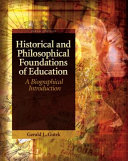
Historical and Philosophical Foundations of Education
By - Gutek, Gerald Lee
Floor
-
Floor 1
Published
-
Pearson, Upper Saddle River, N.J., ©2011
ISBN 10 - 0137152736
ISBN 13 - 9780137152735
Book Status
-
1 Qnty Available with us.
Subject
-
education
Shelf No
-
19
Call Number
-
370.922 GUT
Physical Description
-
xii, 477 pages : illustrations ; 24 cm
Notes
-
Includes index